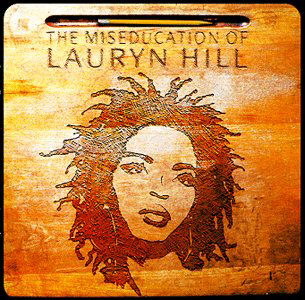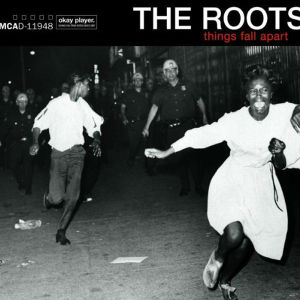THINGS FALL APART: What Happened To Hip Hop's Conscience?
 Has anyone else been wondering what happened to the socially conscious voice in Hip Hop music?
Has anyone else been wondering what happened to the socially conscious voice in Hip Hop music?
Yes, I’m aware that there are plenty of emcees out there in the underground with tons of relevant shit to say. But what about the mainstream? There used to be some semblance of balance in Hip Hop. There was a time when a Neo Soul/alternative Hip Hop movement was a visual, popular alternative to the violence, misogyny, and materialism of mainstream Hip Hop. It was a time when that gorgeous and supernaturally gifted actress from Sister Act 2 became the de facto leader of that movement, and the spokeswoman for a generation.
This article is a love letter to that glorious movement, and an explanation as to why it faded away.
By the late 90’s, it became very clear to record labels that there was a ton of money  to be made from Rap music; particularly rap music of the violent, misogynistic, materialistic variety. In hindsight, the late 90’s is the moment where rap music was poised to assert itself as the most popular genre of music in America. Black music was once again about to go Pop, and violent, materialistic, capitalistic Hip Hop would be its weapon of choice.
to be made from Rap music; particularly rap music of the violent, misogynistic, materialistic variety. In hindsight, the late 90’s is the moment where rap music was poised to assert itself as the most popular genre of music in America. Black music was once again about to go Pop, and violent, materialistic, capitalistic Hip Hop would be its weapon of choice.
But a bonafide renaissance of socially and politically conscious Hip Hop and R&B was gaining unprecedented prominence in pop music. Artists like Erykah Badu, Black Star, The Roots and Dead Prez were making some of the most challenging, adventurous, and staunchly political Black Art since the 1960s, imbuing every element of their work – visually, lyrically, thematically, and stylistically – in a Black aesthetic that paid homage to its past while reaching out to a seemingly bright future. The many classic albums released during this period were firmly grounded in spirituality, introspection and consciousness, while rejecting the materialism and glorification of violence that threatened to sap the art form of its cultural and sociopolitical resonance.
Without question, the icon of this movement was Lauryn Hill. After stealing the show on The Fugees’ The Score (which went on to become of one of the best selling rap albums of all time, and arguably kick started this movement as a force in the mainstream), Hill went rogue and largely self-produced her debut solo album, The Miseducation of Lauryn Hill, in August of 1998. The album was a jaw-dropping critical and commercial smash, winning five Grammy Awards and selling over 8 million copies in the United States alone. Hill’s Miseducation elevated the art form in general and galvanized the neo-soul/alternative Hip Hop movement in particular; giving it a cultural capital it would never have again. Uptight record labels suddenly felt comfortable giving like-minded artists the creative freedom to fully realize their artistic visions and receive the funding necessary to give their albums a respectable marketing push. In her wake, Hill’s peers unleashed a flurry of brilliant albums; namely The Roots’ Things Fall Apart (1999), Mos Def’s Black On Both Sides (1999), D’Angelo’s Voodoo (2000), Erykah Badu’s Mama’s Gun (2000), Dead Prez’s Let’s Get Free (2000), and Common’s Like Water For Chocolate (2000).
Grammy Awards and selling over 8 million copies in the United States alone. Hill’s Miseducation elevated the art form in general and galvanized the neo-soul/alternative Hip Hop movement in particular; giving it a cultural capital it would never have again. Uptight record labels suddenly felt comfortable giving like-minded artists the creative freedom to fully realize their artistic visions and receive the funding necessary to give their albums a respectable marketing push. In her wake, Hill’s peers unleashed a flurry of brilliant albums; namely The Roots’ Things Fall Apart (1999), Mos Def’s Black On Both Sides (1999), D’Angelo’s Voodoo (2000), Erykah Badu’s Mama’s Gun (2000), Dead Prez’s Let’s Get Free (2000), and Common’s Like Water For Chocolate (2000).
By the early 2000s, Neo Soul and alternative Hip Hop had become a financially successful and artistically superior alternative to violent, materialistic, pop-leaning Hip Hop, and Lauryn Hill was unquestionably its figurehead. Just as Nirvana’s Nevermind was the uniting force that bridged together the disparate artists of the alternative rock scene of the early 90’s, Hill’s Miseducation opened the floodgates for socially and politically conscious Black art in the late 90’s.
And yet, just as Nirvana’s self-consciously noncommercial follow-up, In Utero, and Kurt Cobian’s tragic suicide, inevitably signaled the end of alternative rock’s golden age, Hill’s Unplugged 2.0 and subsequent reclusion would signal the very same thing for the Neo Soul/alternative Hip Hop movement.
*Continued on Page 2*

